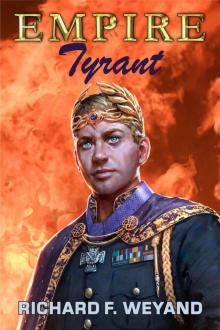- Home
- Richard F. Weyand
Commander
Commander Read online
Books in the EMPIRE Series
by Richard F. Weyand:
EMPIRE: Reformer
EMPIRE: Usurper
EMPIRE: Tyrant
EMPIRE: Commander
EMPIRE: Warlord
EMPIRE: Conqueror
Books in the Childers Universe
by Richard F. Weyand:
Childers
Childers: Absurd Proposals
Galactic Mail: Revolution
A Charter For The Commonwealth
Campbell: The Problem With Bliss
by Stephanie Osborn:
Campbell: The Sigurdsen Incident
EMPIRE
Commander
by
RICHARD F. WEYAND
Copyright 2019 by Richard F. Weyand
All Rights Reserved
ISBN 978-1-7321280-8-8
Printed in the United States of America
Cover Credits
Cover Art: James Lewis-Vines
Back Cover Photo: Oleg Volk
Published by Weyand Associates, Inc.
Bloomington, Indiana, USA
August 2019
CONTENTS
Organizational Difficulties
Vendor Meeting
A Surprising Result
Opportunity
Design Issues
Interest From Afar
Design Reviews
An Unexpected Visit
A Minor Research Project
Another Unexpected Visit
First Testing
Stepping It Up
A More Cordial Meeting
Second Testing
Release To Production
Decisions, Decisions, Decisions
Plans, Counterplans, And Bots
Project X
It Begins
Phalia
Garland
The ‘Visiting Warship’
Addenda
A Couple Of Heads Up
Settling Down
Project X Continues
Quiet But Simmering
Project Far Sight
Invitation
The Meeting
The Request
The Tinder And The Spark
War!
Organizational Difficulties
“All right. Run this past me again. We’re doing what, now?” asked Paul Heller, the yard chief of the General Space and Specialties Corporation spacedock facility on Helsinki, the capital planet of the Helsinki Sector.
“We’re going to take out the environmental section, the food stores, the messes, the bunkrooms and offices and cabins, the potable water supply, the back-up bridge and control rooms, the damage control section, all of that. Everything that has to do with the crew. We’re keeping the electronics bays, and consolidating them all in this small space here.”
Walter Swanson, the chief engineer at the Helsinki facility, pointed to a box on the diagram.
“Then we’re going to triple the magazine size, as shown here, and double the reaction mass stores, as shown here and here,” Swanson said, pointing out each section in turn.
“But all you’re going to have left is the missile impeller, the magazines, the engines, and the reaction mass, plus these little electronics and stores bays.”
“Yup. That’s the plan.”
“And you’re sure we’re not going to get in trouble hacking up a perfectly good battleship like that?” Heller asked.
“I’m sure. That’s what they want. No crew on board at all. Just a remotely piloted missile platform.”
“Well, I can see one big problem with this already.”
“What’s that,” Swanson asked.
“So let’s say a bunch o’ these go out there and beat the other guys, right?”
“Yeah. So?”
“So who accepts their surrender?”
Imperial General Brian Daggert of the Imperial Guard, Imperial General Martin Kraus of the Imperial Marines, and Imperial Admiral Howard Leicester of the Imperial Navy, stood as the Emperor Trajan entered the conference room. The Emperor – Robert Allen Dunham – was followed by the Empress, Amanda Peters, and the Co-Consul, Geoffrey Saaret. They took their seats at the conference table, the Emperor sitting first.
“Be seated, gentlemen,” Dunham said.
The military men sat down. They were all in uniform, each with the coronet of six stars on their shoulder boards that indicated the highest rank in the Imperial military forces, Imperial Admiral or Imperial General. Daggert’s uniform was the same as Kraus’s, except for the addition of the gold fourragère of the Imperial Guard. The Imperial Guard was much smaller than the other two services, for its role was the protection of the Emperor within the Imperial Palace.
In contrast, Dunham, Peters, and Saaret were in normal office dress, although Dunham wore the small version of the Sintar Cross, the Empire’s highest award for valor, on the lapel of his suit jacket. It was honestly earned, in battle on Wollaston, almost nine years ago, when Dunham was in the Imperial Marines. He still walked with a slight limp when he was tired.
“Admiral Leicester, you sent me a heads up that there were some organizational issues you wished to discuss at this week’s meeting. I brought along some extra resources to consider the problem. Let’s start with that subject, and then we can release the Empress and Co-Consul before we go on to more routine matters.”
“Yes, Your Majesty.
Leicester gathered his thoughts and then jumped in.
“Sire, Milady Empress, Mr. Saaret, we are considering how to organize the Imperial Navy in the scenario where most of our ships are remotely crewed in Virtual Reality over zero-flight-time Quantum Entanglement radio. We all know the advantages this move gives us. Our personnel are not exposed on the battlefield, we do not lose experience when we lose a ship, we actually gain it, and the ships themselves can perform better without all the extra mass of the crew support infrastructure and without having to restrain accelerations to those endurable by a human crew.
“Another advantage is that one crew can actually be fighting multiple ships. Given travel times in hyperspace, the crew only needs to be interactive with each ship a small portion of the time, so a single crew can effectively man several ships.
“All that said, it raises an organizational problem. As Your Majesty surely knows –“ Leicester gestured toward the Sintar Cross on Dunham’s lapel “– unit cohesion is a huge factor in military readiness and response. Soldiers and spacers will do extraordinary things under duress in order to not let down their team. The Imperial Marines and the Imperial Navy encourage that unit cohesion in numerous ways, from living together and training together to deploying together and earning unit honors together.”
Dunham nodded. He had crawled up onto the last surviving gun of his company’s emplacement dragging his half-severed leg behind him, bleeding out as he fought off the Estvian regulars attacking the Imperial Marine base on Wollaston, while his brother-in-law, Sean Garrity, had dragged heavy ammunition box after heavy ammunition box to the big gun, despite a severe concussion and several broken ribs. To do otherwise, to abandon the emplacement and escape through the armored door into the base, would have left the dead and wounded of Sean’s platoon exposed to the enemy advance. It was, quite simply, unthinkable, despite their own serious injuries.
“Understood, Admiral. Proceed.”
“Yes, Sire. The problem is how to maintain what we see as the necessary unit cohesion when crews are fighting multiple remotely piloted ships. The crew members need not live together, need not know each other, need not even be on the same planet. They could VR in to their duty stations from home, for that matter. The flexibility it gives us is breathtaking, but to what then does the crew’s loyalty attach? In the Imperial Navy, crew loyalty normally a
ttaches to the ship. The primary unit cohesion is on a ship by ship basis. But a crew may be fighting five different ships, depending on the day. Today they are the HMS Indomitable, tomorrow the HMS Reliant, the next day the HMS Defiant, and so on.
“Further, each of those ship names has their own battle record, their own unit honors, accrued over centuries, in which the crews take a great deal of pride. So it’s a tough problem, and it’s getting more urgent. Our first two dozen conversions of conventional ships will be done soon. We’ve discussed different methods of addressing the problem, but I thought I would ask Your Majesty for your thoughts on the matter.”
Dunham turned to Saaret and Peters and raised an eyebrow. Saaret caught the glance and nodded to Dunham.
“General Kraus,” Saaret said. “How do the Imperial Marines handle this? You don’t have unit cohesion on a ship basis.”
Kraus, who had been listening with interest, stirred.
“No, Mr. Saaret. We foster cohesion to the local structure. To the platoon, the company, and the battalion. Even to the regiment and division, for that matter. And to the Imperial Marines as a whole, of course. A lot of these structures adopt nicknames, to enhance cohesion. ‘Donnelly’s Devils’ or the like. We try to keep promotions and transfers of both enlisted and commissioned personnel largely local, so there is never a large amount of turnover in a given organization. There’s always some core of people remaining to carry on the traditions of the unit.”
“So you don’t have equipment-centered unit cohesion.”
“No, Mr. Saaret. We do have equipment, like large field artillery and tanks and the like. They simply have inventory numbers, however, not formal names. The units will paint nicknames on them and the like, but the loyalty isn’t centered around the equipment. If the machine is disabled or breaks down, the Marines will dismount and carry on fighting as a unit without it.”
“I see.”
Peters had been quiet through all of this, just soaking it up. Her vacant look cleared suddenly and she spoke up.
“Name the crews, not the ships,” Peters said.
“Excuse me, Milady?” Leicester asked.
“Name the crews, Admiral Leicester. This bunch of people here, under this captain, that is the HMS Reliant. They are the heirs of the accrued battle honors. Give the ships inventory numbers, like the Marines do for their equipment. But no matter which physical ship the crew is fighting today, it is the crew that is the HMS Reliant.
“As for having the crew dispersed over different locations and planets, perhaps even VRing in from home, I think that’s a flexibility we shouldn’t use except in extremis. Better would be to have them all housed in the same barracks when deployed, so to speak. Let them go on leave together when their equipment is all in hyperspace and they don’t have to man stations. Otherwise, they live together, eat together, have in-person meetings with each other, all in the same building. Hang a name board on the building that says HMS Reliant, put their battle honors in the lobby, and have any other personnel entering the building have to request permission to come aboard. Just like a ship.”
Leicester sat looking at her for a moment, then started to nod.
“I think that’s the best idea I’ve heard so far, Milady. Every other idea I’ve heard was centered around the ships retaining names. That’s just the way we think. But none of them were satisfactory. This I think could work. Thank you.”
Amanda nodded to him.
“Would different ships in a fleet need to similarly be on the same planet, Admiral Leicester?” Dunham asked.
“No, Sire. Our captains and flag officers are used to communicating almost entirely in VR. We don’t do a lot of shuttling back and forth between ships for in-person meetings. It’s not really possible in hyperspace anyway – one little slip in your ship handling and you drop below 0.35 g and drop out of hyperspace, with no QE radio to even let people know where you are. So we can compose fleets of ship crews located anywhere in the Empire.”
“All right. Well, I’ll let you work out the best solution with your staff, Admiral Leicester,” Dunham said. “Know, though, that funds are available to build or modify buildings if you go the way Milady Empress suggests. We are saving so much money on warship construction and deployment, whatever we need to spend on other items associated with the deployment of the remotely piloted ships is easily covered.”
“Thank you, Sire.”
Dunham nodded, then turned to Saaret and Peters.
“Thank you for your help, Mr. Saaret, Milady Empress,” Dunham said.
As they stood to leave, Dunham stood, and so perforce did the officers. When they had gone, Dunham sat back down.
“Be seated, gentlemen. Let’s proceed now to our normal agenda.”
That night Bobby Dunham and Amanda Peters were in the Emperor’s private gardens on the roof of the Imperial Palace tower, some three hundred feet above ground level.
The gardens were built and maintained by the Imperial Guard as a way of allowing the Emperors and Empresses of Sintar to relax out of doors without leaving the security bubble of the Imperial Palace. It was a six-acre space of grass and trees and flowers, artificial streams and waterfalls and koi ponds, stone walking paths and intimate meadows and shaded verandas, protected from the winds aloft by a twenty-foot-tall glass screen around the edge of the roof. The gardens included recreational facilities such as a swimming pool, hot tub, swimming hole, fire pit, barbecue and picnic area, and tennis and bocce courts.
Dinner tonight had been thin-sliced filet mignon on hamburger buns, onion rings, and apple sauce at the picnic table by the fire pit. Now they were cuddled up like spoons on the chaise lounge, he on his side and she curled up in his arms, both facing the fire.
“That was a really good idea you had today, to name the crews rather than the ships. You pulled a bunny out of the hat. Again.”
In the year since they’d met, Peters had gotten something of a reputation for coming up with innovative solutions to thorny problems.
“You guys just had a set way of thinking, based on what you already knew of the Navy. In some sense you knew too much. It constricted your possible solution set, or at least the way you thought about the problem.”
“So if you want an outside-the-box answer....”
“Get somebody who doesn’t know there’s a box. Exactly.”
“Still, an elegant solution. And obvious once it’s pointed out.”
“Maybe. We don’t know if it will work. I’m still thinking about the problem. Maybe I’ll have other ideas. Or someone else will.”
“Perhaps.”
They lay watching the fire. After several minutes, Peters broke the silence.
“So what’s going on with the new ship designs. Have they come in yet?”
“Yes. The vendors aren’t getting it. We’re going to have to have them all resubmit. Go another round.”
“That’s not good. I worry about the delay. Those shipbuilders have got to be hurting.”
“Any good ideas there?”
“No. Not yet, anyway. That’s a tough one.”
“Well, give it some thought. Maybe something will come up.”
Imperial Navy architects had come up with a plan for a building to house the ship’s crew while deployed. They weren’t ship designers, they were conventional architects, because they were designing a building for construction on the ground. Higher-ups, though, had required they bring in actual ship crew members who were on base between deployments to offer feedback on their design.
The architects were all there. The lead architect made a presentation to the assembled crewmen in a lecture room simulation in VR. All shipboard ranks were represented, from seaman recruit up through senior chief petty officer, as well as the commissioned ranks from ensign to captain. The presentation covered the idea of the ship’s crew bearing the ship’s name regardless of which remotely crewed vessel they were operating today, and then walked them through the building plans.
After the pres
entation, everybody was given some time to discuss the concepts among themselves. A group of senior chiefs and chiefs who had sat together had a particularly lively conversation during this break.
After forty-five minutes of private discussions, the lead architect called the room back to order and asked for input on the building design. He called on the senior captain present.
“Captain Fisher, would you care to start us off?”
“Actually, Mr. Baum, I would like to hear what the chiefs have to say. That looked like a pretty lively conversation going on there, so maybe we should start with them.”
“Very well, Captain. Do the chiefs have a spokesman to start us off?”
“Yeah, I can start,” one big senior chief with an armful of service stripes said.
“Very well, Senior Chief Willet. Go ahead.”
Gordon Willet consulted the notes he had made during the discussion.
“First thing is lose all the windows. No windows aboard ship.”
“But natural light and ventilation is a major factor in human ergonomics, Senior Chief.”
“Never been on a warship, have you, Mr. Baum? No fuckin’ windows. Not one. We don’t need our people lollin’ around, lookin’ out the windows at the weather or the pretty girls. Just lose ‘em.”
Willet consulted his notes.
“Next thing I got is, Where’s the Mess?”
“We have both an officer’s mess and an enlisted mess in the plans, Senior Chief.”
“Yeah, I seen that. I’m talkin’ about the Chiefs Mess. The Goat Locker. Where is it?”
“The Goat Locker, Senior Chief?”
“Yeah. Shipboard we got a separate mess, lounge, and bunk area all to ourselves. Chiefs and senior chiefs.”
“We had anticipated the chief petty officers and senior chief petty officers eating in the enlisted mess, Senior Chief, and having individual rooms near their departments.”
“That’s not how it works, Mr. Baum. The chiefs as a group are responsible for crew development and readiness. We gotta be able to work together, assist each other, and also maintain some separation from our charges. That’s how the culture works. You need to fix that.”

 EMPIRE: Succession
EMPIRE: Succession Commander
Commander QUANT (COLONY Book 1)
QUANT (COLONY Book 1) EMPIRE: Renewal
EMPIRE: Renewal GALACTIC SURVEY (COLONY Book 3)
GALACTIC SURVEY (COLONY Book 3) Campbell- The Problem With Bliss
Campbell- The Problem With Bliss EMPIRE: Intervention (EMPIRE SERIES Book 13)
EMPIRE: Intervention (EMPIRE SERIES Book 13) EMPIRE: Investigation
EMPIRE: Investigation A Charter for the Commonwealth
A Charter for the Commonwealth EMPIRE: Resistance
EMPIRE: Resistance EMPIRE: Warlord (EMPIRE SERIES Book 5)
EMPIRE: Warlord (EMPIRE SERIES Book 5) EMPIRE: Resurgence
EMPIRE: Resurgence EMPIRE: Conqueror (EMPIRE SERIES Book 6)
EMPIRE: Conqueror (EMPIRE SERIES Book 6) Tyrant
Tyrant Usurper
Usurper Galactic Mail: Revolution! (Childers Universe Book 3)
Galactic Mail: Revolution! (Childers Universe Book 3) Galactic Mail_Revolution!
Galactic Mail_Revolution! Childers
Childers CHILDERS_Absurd Proposals
CHILDERS_Absurd Proposals